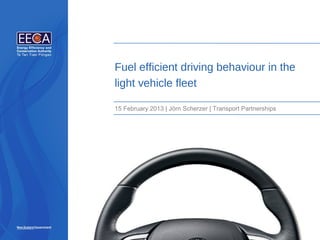Fuel efficient driving behaviour
•Download as PPT, PDF•
0 likes•1,511 views
The document discusses promoting more fuel efficient driving behaviors among light vehicle fleets. It notes that better driver behavior can reduce fuel consumption by 5-10% with additional benefits. It outlines common objections people have to driving efficiently and maintaining their vehicles for efficiency. The document proposes that success by 2016 would be 75% of the public aware that their driving and maintenance can save 10% in energy, and a 1% improvement in light fleet efficiency from better techniques, maintenance, and behaviors. It asks how such outcomes could be measured.
Report
Share
Report
Share

Recommended
Recommended
More Related Content
Similar to Fuel efficient driving behaviour
Similar to Fuel efficient driving behaviour (20)
GreenRoad and CCJ Webinar on Fleet Management driver safety

GreenRoad and CCJ Webinar on Fleet Management driver safety
More from SEA - Sustainable Energy Advice Ltd
This IEA DSM behaviour change lecture was given by Dr Sea Rotmann to the International Energy Centre in Brisbane, Australia.
Behaviour Change lecture to the International Energy Center in Brisbane

Behaviour Change lecture to the International Energy Center in BrisbaneSEA - Sustainable Energy Advice Ltd
IEA DSM Task 24 on behaviour change presented their latest findings and exciting new work in Phase 2 to the Queensland Government on December 18, 2016.How to change behaviour - a presentation to Queensland Government

How to change behaviour - a presentation to Queensland GovernmentSEA - Sustainable Energy Advice Ltd
Dr Sea Rotmann, Task 24 Operating Agent, gave a very in-depth presentation on everything energy & behaviour change from the many findings of Phase I of the Task to an audience of policymakers, researchers, community leaders and industry in Toronto, on May 27, 2015.Everything there is to know about energy & behaviour from IEA DSM Task 24 Pha...

Everything there is to know about energy & behaviour from IEA DSM Task 24 Pha...SEA - Sustainable Energy Advice Ltd
More from SEA - Sustainable Energy Advice Ltd (20)
Wellington Task 24 workshop Energy Cultures conference

Wellington Task 24 workshop Energy Cultures conference
Insights to Irish consumer behaviour and action IEA DSM Task 24

Insights to Irish consumer behaviour and action IEA DSM Task 24
The toughest behaviour change challenge in energy efficiency

The toughest behaviour change challenge in energy efficiency
Behaviour Change lecture to the International Energy Center in Brisbane

Behaviour Change lecture to the International Energy Center in Brisbane
How to change behaviour - a presentation to Queensland Government

How to change behaviour - a presentation to Queensland Government
Introduction to IEA DSM Task 24 on behaviour change

Introduction to IEA DSM Task 24 on behaviour change
Everything there is to know about energy & behaviour from IEA DSM Task 24 Pha...

Everything there is to know about energy & behaviour from IEA DSM Task 24 Pha...
All you ever wanted to know about energy and behaviour change

All you ever wanted to know about energy and behaviour change
Fuel efficient driving behaviour
- 1. Fuel efficient driving behaviour in the light vehicle fleet 15 February 2013 | Jörn Scherzer | Transport Partnerships
- 2. Why light vehicles? 2
- 3. Why driving behaviour? Better driver behaviour can reduce fuel consumption by between 5% and 10%, with road safety and climate change co-benefits. 3
- 4. Context • “I already drive safely and efficiently” • “The savings are not worth the hassle” • “I can’t see any other reasons to drive efficiently” • “I change sometimes but forget to keep it up” • “It’s a step too far” • “Willingness-to-pay to learn fuel efficient behaviour is low” • “I forget to check tyre pressure and don’t know what it should be” • “Our vehicle fleet is old” • “The government has limited reach” 4
- 5. What would ‘success’ mean? • By 2016, 75% of the public are aware that their driving (and car maintenance) behaviour can result in 10% energy savings. • By 2016, a 1% improvement is achieved in light fleet fuel efficiency from better driving techniques, maintenance, and associated behaviours. How do you measure this? • individual project objectives and outputs • consumer attitude monitoring • other (more direct) ways? 5
- 6. What would ‘success’ mean? • By 2016, 75% of the public are aware that their driving (and car maintenance) behaviour can result in 10% energy savings. • By 2016, a 1% improvement is achieved in light fleet fuel efficiency from better driving techniques, maintenance, and associated behaviours. How do you measure this? • individual project objectives and outputs • consumer attitude monitoring • other (more direct) ways? 5
